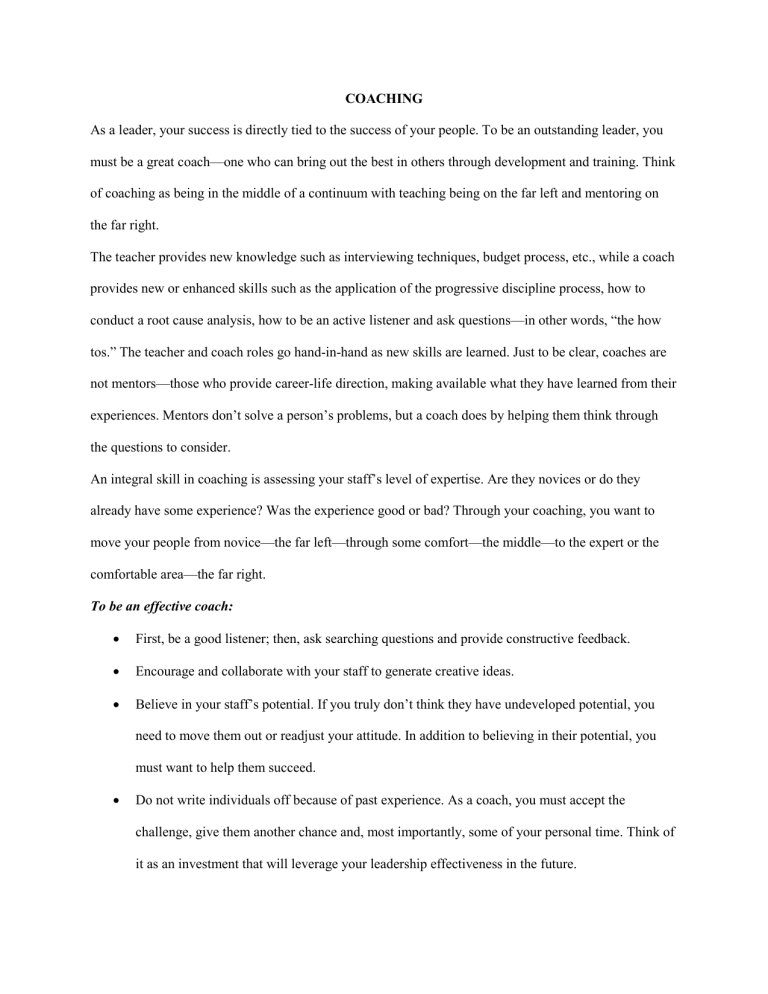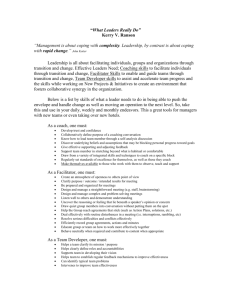COACHING As a leader, your success is directly tied to the success

COACHING
As a leader, your success is directly tied to the success of your people. To be an outstanding leader, you must be a great coach—one who can bring out the best in others through development and training. Think of coaching as being in the middle of a continuum with teaching being on the far left and mentoring on the far right.
The teacher provides new knowledge such as interviewing techniques, budget process, etc., while a coach provides new or enhanced skills such as the application of the progressive discipline process, how to conduct a root cause analysis, how to be an active listener and ask questions—in other words, “the how tos.” The teacher and coach roles go hand-in-hand as new skills are learned. Just to be clear, coaches are not mentors—those who provide career-life direction, making available what they have learned from their experiences. Mentors don’t solve a person’s problems, but a coach does by helping them think through the questions to consider.
An integral skill in coaching is assessing your staff’s level of expertise. Are they novices or do they already have some experience? Was the experience good or bad? Through your coaching, you want to move your people from novice—the far left—through some comfort—the middle—to the expert or the comfortable area—the far right.
To be an effective coach:
•
First, be a good listener; then, ask searching questions and provide constructive feedback.
•
Encourage and collaborate with your staff to generate creative ideas.
•
Believe in your staff’s potential. If you truly don’t think they have undeveloped potential, you need to move them out or readjust your attitude. In addition to believing in their potential, you must want to help them succeed.
•
Do not write individuals off because of past experience. As a coach, you must accept the challenge, give them another chance and, most importantly, some of your personal time. Think of it as an investment that will leverage your leadership effectiveness in the future.
•
Tell your staff precisely the truth they need, at precisely the time they need it. To succeed, coaches need to invest time and attention in understanding how people see their lives, what they are sensitive about, what energizes them, and what makes them lose energy. Positioning your staff for success means moving them along the development continuum from novice to expert . The key is not to use the sink or swim approach even if it is the way you learned. Development shouldn’t be an endurance test but a growing and stretching process that you and your staff feel good about.
•
Explain what they should expect using your own experiences. For example, if they have submitted an article for publication, explain what the review process is like and how to handle the suggestions and edits.
•
Make this growth experience as positive as possible so they will want to repeat it.
•
Role play or practice if needed. You know some of the typical employee responses so sharing these will help the person handle the situation in question. The more prepared they are, the better they can handle any curves that come their way.
•
Let them handle the situation themselves—even if you are present—so they learn from their experience and gain confidence.
•
Debrief them after the experience. Ask them how they think it went, how they felt, and what they might do differently next time. Provide feedback and don’t forget to affirm their progress which will build their self-esteem and confidence. As well as providing this valuable feedback, remember your role as coach is to help the people you’re coaching to be honest and straightforward when observing their own behaviors and actions.
•
Consider sharing some of your personal stories to show they are not alone and that their challenges can be conquered.
Always view coaching as an essential part of your role as director and leader. To gain insight into your coaching abilities, you might consider asking your staff or requesting Human Resources to ask your team
to asses you as a coach. Your success is derived from your staff’s success so make sure every member of your leadership team takes coaching staff seriously.
One of the best fringe benefits to coaching and developing staff is the reputation you will gain in the community. It will make you the local employer of choice and assist you in recruiting when you have open positions.
The takeaway lesson: A successful coach has staff who feel that their directors believe in them, think they are capable and talented by letting them know through words and actions that they want them to succeed and trust them. If they believe that, then you have done your job well!



